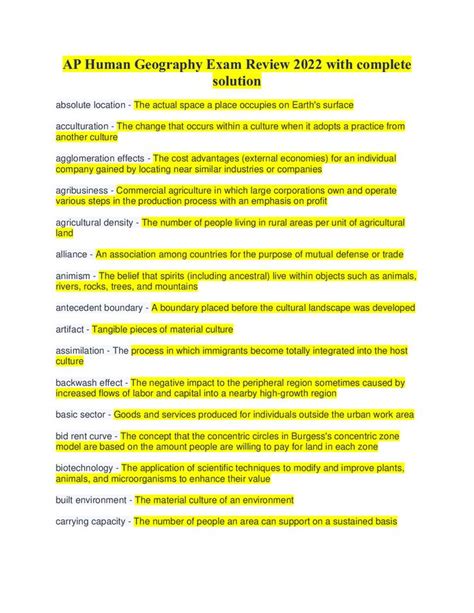Introduction

Decolonization, the process of dismantling colonial structures and institutions, has emerged as a critical lens through which to examine the world system. In AP Human Geography, understanding decolonization is essential for comprehending the complex interactions between nations and the ongoing legacies of colonialism. This article delves into the multifaceted dimensions of decolonization, its historical underpinnings, and its implications for contemporary human geography.
Historical Context
Colonialism and Its Impacts
For centuries, European powers exerted colonial control over vast territories around the globe. Colonialism involved the systematic exploitation of resources, suppression of local cultures, and imposition of foreign ideologies. It left profound scars on colonized societies, including economic inequality, cultural erasure, and political instability.
According to the United Nations, over 600 million people worldwide still live in former colonies. The legacy of colonialism continues to shape their experiences, from economic and social disparities to ongoing political conflicts.
Decolonization Movements
Beginning in the mid-20th century, decolonization movements gained momentum around the world. Inspired by nationalism and anti-imperialist sentiments, these movements demanded independence and self-determination for colonized peoples.
Between 1945 and 1960, over 40 countries in Africa and Asia gained independence from European powers. This period, known as the “Age of Decolonization,” marked a significant shift in global power dynamics.
Theoretical Perspectives
Postcolonial Theory
Postcolonial theory emerged in the 1970s to critique the lasting effects of colonialism. It argues that colonialism’s legacies persist in present-day structures and institutions, shaping political, economic, and social relations.
Decolonial Theory
Building upon postcolonial theory, decolonial theory emerged in the 1990s. It advocates for a radical break from colonial paradigms and the construction of new knowledge systems and ways of being.
Key Concepts
- Neocolonialism: The continued economic and political influence of former colonial powers in postcolonial societies.
- Eurocentrism: The centering of European perspectives and knowledge systems in academic discourse and cultural practices.
- Indigenization: The process of restoring the rights, cultures, and languages of indigenous peoples who have been marginalized by colonialism.
Geographical Implications
Economic Geography
Decolonization has had profound implications for economic geography. Former colonies often face challenges such as economic dependency, resource extraction, and unequal trade relationships. Decolonization efforts aim to promote economic diversification, address inequalities, and ensure equitable access to resources.
Political Geography
Political decolonization brought about new nation-states. However, many of these states have struggled with stability, conflict, and corruption due to colonial boundaries, ethnic divisions, and the legacies of power struggles.
Cultural Geography
Decolonization movements have led to cultural revitalization and the resurgence of indigenous cultures. Preserving cultural diversity, language rights, and traditional knowledge systems are crucial aspects of decolonization.
Contemporary Applications
Decentering Eurocentrism in Education
Educational institutions play a vital role in decolonizing knowledge production. Incorporating perspectives from non-Western cultures, indigenous knowledge, and marginalized voices helps create a more inclusive and accurate understanding of the world.
Restoring Indigenous Territories
Land rights and the preservation of indigenous territories are central to decolonization. Efforts to return land to indigenous communities, empower local decision-making, and protect traditional land uses are gaining momentum globally.
Promoting Social Justice
Decolonization goes beyond political independence. It encompasses social justice initiatives that address the ongoing legacies of colonialism, such as racism, inequality, and discrimination.
Tables
Table 1: Decolonization Movements by Region
| Region | Number of Countries | Years of Independence |
|---|---|---|
| Africa | 54 | 1956-1990 |
| Asia | 41 | 1947-1975 |
| Latin America and the Caribbean | 33 | 1804-1981 |
Table 2: Economic Impacts of Decolonization
| Indicator | Developed Countries | Less Developed Countries |
|---|---|---|
| GDP per capita (USD) | 13,208 | 1,310 |
| Life expectancy (years) | 80 | 68 |
| Infant mortality rate (per 1,000 live births) | 5 | 31 |
Table 3: Political Challenges in Postcolonial States
| Challenge | Description |
|---|---|
| Ethnic conflicts | Tensions between different ethnic groups, often based on colonial divisions |
| Corruption | Widespread abuse of power and misappropriation of public funds |
| Instabilities | Political instability, coups, and civil wars |
Table 4: Indigenous Land Rights Movements
| Country | Movement | Year |
|---|---|---|
| Canada | Idle No More | 2012 |
| Australia | Uluru Statement from the Heart | 2017 |
| Peru | Indigenous People’s Roundtable | 2020 |
Conclusion
Decolonization is a complex and ongoing process that continues to shape the world system. By examining its historical roots, theoretical underpinnings, and contemporary applications, AP Human Geography students gain a deeper understanding of the legacies of colonialism and its impact on human societies. Through decolonizing geographical knowledge and practices, we can contribute to a more just and equitable world.
